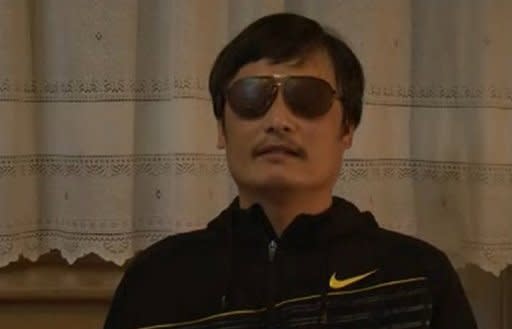Activist Chen could leave China 'soon': friends
Chinese activist Chen Guangcheng is preparing to go to the United States and might leave soon, friends said, after Beijing and Washington crafted a diplomatic solution to allow his departure. Chen is at the centre of a major wrangle between China and the United States after he dramatically escaped harsh house arrest in the eastern province of Shandong and sought refuge at the US embassy in Beijing. He left the diplomatic mission on Wednesday after being holed up inside for six days, but later had a change of heart, saying he wanted to leave China for his safety and that of his wife and two young children. China's foreign ministry said on Friday that he would be allowed to apply to study abroad, signalling then-visiting US Secretary of State Hillary Clinton had secured a deal with the Chinese government. Chen, 40, a self-taught lawyer, is believed to still be in a Beijing hospital being treated for injuries sustained during his escape from his village home, where he says he was beaten and kept under constant surveillance. Jerome Cohen, a New York University professor who is a friend and adviser to Chen, said he may go to the United States "soon". "It's conceivable he could be here quite soon," Cohen told AFP by telephone from his US home. "I'm hoping it's a done deal. I was very excited when I saw the announcement by the foreign ministry spokesman on Friday afternoon," he said. "That's an open signal that they are prepared to let him come abroad for a period of study," said Cohen late Saturday, who spoke to Chen twice before he left the US embassy but not since. A spokesman for New York University said Friday that Chen had been invited to study there. The hospital Sunday declined to confirm if Chen was still there and a spokesman for the US embassy could not be reached for comment. Chen, who Thursday spoke to US lawmakers from hospital, could not be reached by phone. But fellow activist lawyer Jiang Tianyong, who spoke to Chen by phone late Saturday, said his friend told him he would probably be in the hospital a few more days for treatment. "The current situation is that he hopes he and his family can go together to the United States to rest for a time," Jiang told AFP on Sunday. "He hopes to come back." Jiang was detained at the hospital Thursday evening by police who beat him and warned him against supporting Chen, before releasing him early Friday. The entrances of the Chaoyang Hospital compound remained tightly guarded by uniformed police on Sunday and the wary authorities kept journalists in a designated area outside, an AFP photographer witnessed. Chen infuriated Beijing after he exposed forced abortions, some late in pregnancy, and sterilisations under the "one-child" policy. He defied pressure to stay silent after a four-year jail term that ended in 2010. Another friend of Chen's, activist He Peirong who helped transport him to a safe location after his escape, said Sunday she supported his decision. "Chen Guangcheng is free. I believe Chen Guangcheng can independently judge to make the best arrangement for himself and his family," she said in a posting on Twitter. If Chen decides to take up the NYU offer, he would be a visiting scholar at the law school with a programme of study and lecture, Cohen said. "I wouldn't be surprised if he got here within a week. But if it takes a month, it doesn't matter and it wouldn't surprise me either," he said. US officials appeared to be keeping the details, including a timescale, of the agreement with Beijing deliberately vague, fearing that it would fall through if China felt embarrassed on its home soil. The US State Department said it expected China to move "expeditiously" to grant Chen a passport. One analyst said if Chen was allowed to leave, which was expected, it showed China and the United States could negotiate despite their differences. "At this point, it's the most face-saving way out of all of this," said Joshua Eisenman, senior fellow in China studies at the Washington-based American Foreign Policy Council. "There's been an ability to sit down, negotiate and get quick results under pressure. That suggests the United States and China are willing to work together," he told AFP.




